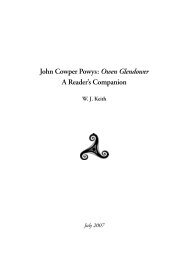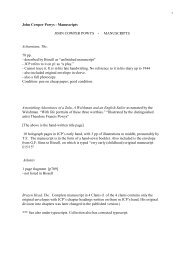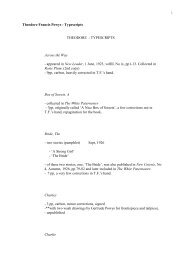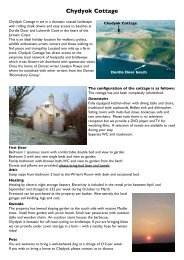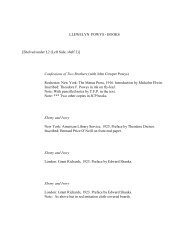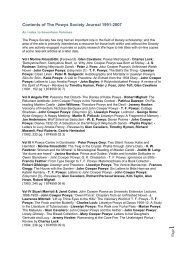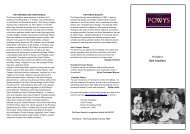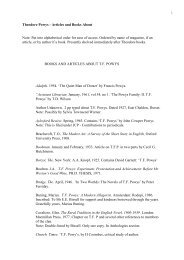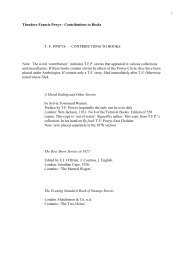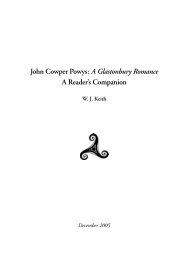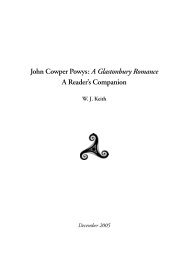J. C. Powys' Autobiography: A Reader's Companion - Site POWYS
J. C. Powys' Autobiography: A Reader's Companion - Site POWYS
J. C. Powys' Autobiography: A Reader's Companion - Site POWYS
Create successful ePaper yourself
Turn your PDF publications into a flip-book with our unique Google optimized e-Paper software.
20 <strong>Autobiography</strong><br />
Doré (488) — Gustave Doré (1833–1883), French<br />
engraver and illustrator, who illustrated many<br />
books that were special favourites of JCP,<br />
including the Bible, The Divine Comedy, Rabelais,<br />
Don Quixote, and Paradise Lost.<br />
Dorian strain (112) — One of the six “modes” of<br />
ordering a musical scale known in ancient times<br />
as “the Dorian mode.” JCP’s phrase probably<br />
derives from Milton’s Paradise Lost (I 550).<br />
Dostoievsky (8, 9, 271, 286, 311, 339, 341, 376, 381,<br />
387, 390, 410, 422, 432, 445, 452, 457, 469, 475, 485,<br />
505, 516, 524–5, 526, 528, 538, 610, 649) — Fyodor<br />
Dostoievsky (1821–1881), Russian novelist, author<br />
of Crime and Punishment (1861), The Idiot (1869),<br />
The Possessed (or The Devils, 1872), and The<br />
Brothers Karamazov (1878–80). L’Esprit Souterrain<br />
(526) is the French equivalent of Notes from<br />
Underground (1864). JCP published a critical<br />
study entitled Dostoievsky (1946) and essays on<br />
him in Visions and Revisions and The Pleasures of<br />
Literature.<br />
Doughty (348) — C. M. Doughty (1843–1926),<br />
author and traveller, best known for Travels in<br />
Arabia Deserta (1888) and his long poem The<br />
Dawn in Britain (1906). The former is mentioned<br />
in A Glastonbury Romance (486). JCP wrote a<br />
review of Arabia Deserta for the Dial (1927).<br />
Dove (1, 31) — A picturesque river flowing<br />
through Derbyshire. Dovedale (1) is the valley<br />
through which it flows.<br />
Dowson, Ernest (182, 342, 513) — English poet of<br />
the 1890s (1867–1900).<br />
“dram of eale” (330) — A textual crux in<br />
Shakespeare’s Hamlet (I iv 36). Scholars are<br />
divided on both the reading and its meaning. It is<br />
often emended to “dram of evil.”<br />
Dreiser (363, 426, 450, 491, 511, 528, 534, 548, 550,<br />
551–5, 556, 558, 575, 594, 600, 613, 637,<br />
648) — Theodore Dreiser (1871–1945), American<br />
novelist best known for Sister Carrie (1900) and<br />
The Titan (1914). The “Genius” (600) appeared in<br />
1915 and contains much autobiographical<br />
material; “attacks” on the book came from the<br />
New York Society for the Suppression of Vice.<br />
JCP’s “Protest” at their activities is reprinted in<br />
Elusive America. JCP reviewed the book<br />
enthusiastically in the November 1915 Little<br />
Review. Dreiser and JCP were close friends in the<br />
latter’s American years (Peltier [internet]). JCP<br />
later described him as, “except for Thomas Hardy,<br />
... the most arresting human being I have ever<br />
met” (The Art of Growing Old [93]). Three of his<br />
essays on Dreiser are reprinted in Elusive<br />
America. For photos, see R. P. Graves (Plate 18)<br />
and Letters to Llewelyn (I, between 208 and 209).<br />
See also “author of ...”<br />
Dreiser’s brother Paul (585) — John Paul Dreiser,<br />
Jr. (1858–1904), song-writer who took the<br />
professional name of Paul Dresser. Best known<br />
for “On the Banks of the Wabash” (1897), later<br />
adopted as the Indiana state song.<br />
Druids (89, 454, 455) — The religious hierarchy<br />
among the ancient Celts, believed by some to<br />
have originated in Atlantis (q.v.), and associated<br />
with oak-groves (128). Later, JCP presented<br />
Druidism in action in Porius. So, “Druidic” (335,<br />
455, 462, 528) and “Druidical” (644).<br />
“dry” sand ... “wet” sand (19; cf. 15) — To<br />
become an important distinction in Weymouth<br />
Sands, see Peltier (internet).<br />
Dryden, John (236, 254, 256, 314, 551) — English<br />
poet, dramatist, and translator (1631–1700), well<br />
known for introducing precision and discipline<br />
into English verse. His translations of Virgil—the<br />
Pastorals, Georgics, etc.—were particularly<br />
admired. See also “Old as I am ...”<br />
Duke of Wellington (54) — Arthur Wellesley, first<br />
Duke of Wellington (1769–1852), English military<br />
commander and politician. He defeated<br />
Napoleon at Waterloo (1815) and later served as<br />
Prime Minister.<br />
Dulcinea (272) — The woman beloved and<br />
idealized by Don Quixote, “imaginary” because<br />
he believed her to be a princess.<br />
“dum loquimur, fugerat invida ætas” (150) —<br />
“While we speak, envious old age is put to flight”<br />
(Latin). From Horace.<br />
Duncan, Isadora (528, 594) — American dancer<br />
(1878–1927), well known for her spectacular loveaffairs.<br />
One of these was with JCP, who writes<br />
about her, as Elise Angel, in After My Fashion. In<br />
Letters to Llewelyn he describes her as “[t]hat<br />
incomparable Isadora” and “my noble and only<br />
true love” (I 241, 252). A poem “To Isadora<br />
Duncan” is in Mandragora. There are photos in<br />
Letters to Llewelyn (I, opposite 177) and in R. P.<br />
Graves (Plate 10). See also Peltier (internet).<br />
Duns Scotus (631) — Scots theologian and<br />
philosopher (c.1265–1308), an advocate of a<br />
metaphysical system different from that of<br />
Aquinas.<br />
Duomo (386) — Cathedral dome (Italian).<br />
Durant, Will (535, 565, 613) — American<br />
philosopher and author, of French-Canadian<br />
parents, (1885–1981), best known for his Story of<br />
Philosophy (1926) and his Story of Civilization (11<br />
volumes, 1935–1975) written with his wife Ariel.<br />
They often evoke their friend JCP in their Dual<br />
<strong>Autobiography</strong> (1975) See Peltier (internet).<br />
Dürer (355) — Albrecht Dürer (1471–1528),<br />
German artist and engraver.<br />
Dybbuk, The (475) — A play by Solomon<br />
Rappaport Anski (or Ansky), first performed in<br />
1920, that became a popular classic in the Yiddish<br />
theatre. JCP’s essay on the play was first<br />
published in the Menorah Journal in 1927,



